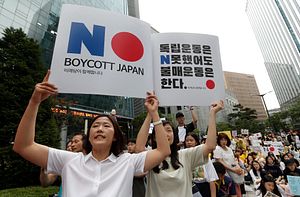Japan’s unresolved trade feud with South Korea has been put on hold until the third week of December, when senior officials from both sides will review Japan’s tightened export controls on semiconductor materials.
The second round of dispute resolution talks at the World Trade Organization (WTO) in Geneva failed to narrow the trade divide. But both countries have pledged to hold a policy dialogue on December 16 in Tokyo, making it the first time Japan and South Korea will resume government talks in three and a half years.
In September, South Korea lodged a formal complaint to the WTO over Japan’s trade restrictions but announced they will halt dispute consultations as long as bilateral talks continue. South Korea can request a WTO dispute settlement panel at any time if it believes there is no prospect of reaching a bilateral deal.
Japan’s Minister for Trade, Economy and Industry Hiroshi Kajiyama stressed that the dialogue is a chance to “confirm the current situation rather than aim for a solution.” He hinted at taking baby steps in “meeting with the premise of moving forward in a positive direction.”
Rocky diplomatic exchanges persisted last month as South Korea’s chief negotiator Chung Hae-kwan spoke to reporters about ending talks altogether, saying, “We will not have talks for the sake of talks.”
Meanwhile, the governments of both countries clashed immediately after South Korea decided not to withdraw from the GSOMIA military intelligence sharing pact six hours before its expiry. South Korea’s National Security Chief Chung Eui-yong accused Japan of deliberately distorting Seoul’s position when releasing the details of the renewed GSOMIA negotiations, adding they had received an apology from Japan over the incident. Kajiyama denied the government offered any apology and maintained that the relevant points had been preapproved by South Korea before their release.
Japan-South Korea tensions hit a new low following a South Korean Supreme Court ruling in October 2018 that ordered two Japanese companies to compensate unpaid Korean wartime laborers also allowing company assets to be seized and sold if payments are not received. Japanese company assets are expected to be auctioned off in South Korea in December. Japan has argued the ruling goes against international law, with Japan’s Foreign Minister Toshimitsu Motegi warning bilateral ties will sink even lower if Japanese company assets are sold.
The wartime forced labor issue stretches back more than 100 years, dating from Japan’s annexation of the Korean Peninsula between 1910 to 1945. However, Japan maintains all wartime reparations were settled in the 1965 Treaty on Basic Relations between the two countries.
Japan retaliated for the Supreme Court ruling in July by removing South Korea from its “white list,” which gives export privileges to selected trade partners. Citing national security reasons, Japan also tightened exports on three semiconductor materials critical to South Korean electronics manufacturers such as tech giant Samsung.
South Korea branded Tokyo’s move as “discriminatory” and “politically motivated,” sparking tit-for-tat trade escalations. That led to an anti-Japanese boycott in Korea, encouraging consumers to campaign against Japanese products such as beer, vehicles, and tourism to Japan.
The trade war has slashed Japan’s economic outlook for fiscal 2019. For example, South Korea is a top export destination for beer, but Japan’s Ministry of Finance recently reported the amount of Japanese beer sales to Korea last month was zero — a stark contrast to the 834 million yen earned the same time last year.













